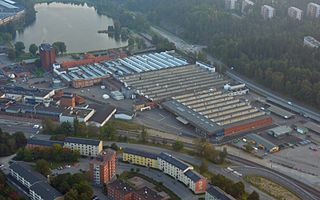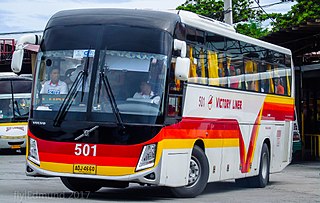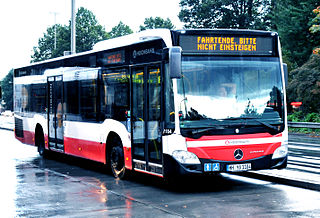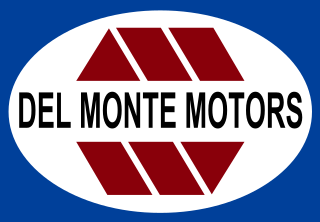
Scania AB, stylised SCANIA in its products, is a major Swedish manufacturer headquartered in Södertälje, focusing on commercial vehicles—specifically heavy lorries, trucks and buses. It also manufactures diesel engines for heavy vehicles as well as marine and general industrial applications.

The Volkswagen Type 2 is a forward control light commercial vehicle introduced in 1950 by the German automaker Volkswagen as its second car model. Known officially as the Transporter, Kombi or Microbus, or, informally, as the Volkswagen Station Wagon (US), Bus, Camper (UK) or Bulli (Germany), it was given the factory designation Type 2 as it followed – and was initially derived from – Volkswagen's first model, the Type 1 (Beetle).

Volvo Buses, stylized as VOLVO, is a subsidiary and a business area of the Swedish vehicle maker Volvo, which became an independent division in 1968. It is based in Gothenburg.

A minibus, microbus, or minicoach is a passenger-carrying motor vehicle that is designed to carry more people than a multi-purpose vehicle or minivan, but fewer people than a full-size bus. In the United Kingdom, the word "minibus" is used to describe any full-sized passenger-carrying van or panel truck. Minibuses have a seating capacity of between 12 and 30. Larger minibuses may be called midibuses. Minibuses are typically front engine step-in vehicles, although low floor minibuses are particularly common in Japan.

The Volvo B7TL is a low-floor double-decker bus chassis which was launched in 1999 and replaced the 2-axle version of the Volvo Olympian. It was built as the British bus operators seemed hesitant to purchase the B7L double decker with a long rear overhang.

The Volvo B7R is a coach chassis available with a range of bodies. It is promoted as a rear engined lightweight coach chassis. It is primarily intended for tourist and long-distance duties. B7R is also manufactured in China, Brazil, Hungary, India and Iran for use in regional transport services.
DINA is a Mexican bus and truck manufacturer based in Ciudad Sahagún, Hidalgo, Mexico. It was created by the federal government of Mexico in 1951 as Diesel Nacional, S.A., and is currently owned by Grupo Empresarial G and its subsidiaries. The company has gone through several stages of production of freight and bus models throughout its history, thanks to technological and commercial agreements and partnerships with various companies such as Fiat, Renault, Marcopolo S.A., Flxible, Cummins, Perkins, Chrysler, Caterpillar, Scania, MCI, Škoda, Spicer, Eaton and Dana. Today its primary production is buses for urban, domestic and foreign use. They have developed their truck technology with a subsidiary of BMW.

Mercedes-Benz has been producing buses since 1895 in Mannheim in Germany. Since 1995 Mercedes-Benz buses and coaches are known by the brand name of Daimler Buses, a wholly-owned subsidiary of Daimler Truck.

A midibus is a classification of single-decker minibuses which are generally larger than a traditional minibus but smaller than a full-size single decker and can be anywhere between 8 metres and 11 metres long. While used in many parts of the world, the midibus is perhaps most common in the United Kingdom, where operators have found them more economical, and to have a sufficient number of seats compared to full size single-decker buses.

Cutaway van chassis are used by second stage manufacturers for a wide range of completed motor vehicles. Especially popular in the United States, they are usually based upon incomplete vans made by manufacturers such as Chrysler, Ford, and General Motors which are generally equipped with heavier duty components than most of their complete products. To these incomplete vehicles, a second stage manufacturer adds specific equipment and completes the vehicle. Common applications of this type of vehicle design and manufacturing includes small trucks, school buses, recreational vehicles, minibuses, and ambulances. The term "cutaway" can be somewhat of a misnomer in most of the vehicle's context since it refers to truck bodies for heavy-duty commercial-grade applications sharing a common truck chassis.

Volkswagen Commercial Vehicles is a German marque of light commercial vehicles, owned by Volkswagen Group. It is headquartered in Hannover, Lower Saxony, Germany. Originally part of Volkswagen Passenger Cars, it has operated as a separate marque since 1995.

Reeve Burgess was a bus body manufacturer based in Pilsley, North East Derbyshire in the United Kingdom. It was a subsidiary of Plaxton from 1980 until its closure in 1991.

The Nissan Civilian is a single-decker minibus built by Japanese automaker Nissan since 1971. It is primarily available as a public bus and an intercity bus. In Japan, it was exclusive to Nissan Store locations, and replaced the Nissan Echo, which was introduced in 1958. The Echo's chassis code continued to be used on the Civilian (GC340), reflecting their shared underpinnings with the Nissan Caball (C140/240/340).

Volkswagen Truck & Bus Indústria e Comércio de Veículos Ltda., formerly known as Volkswagen Caminhões e Ônibus, is a Brazilian commercial vehicle manufacturing company based in Resende, Brazil and a subsidiary of Traton. It manufactures heavy trucks and buses under the Volkswagen marque.

In 2015 Spain produced 2.7 million cars which made it the 8th largest automobile producer country in the world and the 2nd largest car manufacturer in Europe after Germany a position in the ranking that it was still keeping in 2024. Approximately 80% of that production is for export. During the first half of 2016, with exports valued over 24 billion euros over that period, the automotive industry accounted for 18.9% of the total Spanish exports.

MAN Truck & Bus SE is a subsidiary of Traton, and one of the leading international providers of commercial vehicles. Headquartered in Munich, Germany, MAN Truck & Bus produces vans in the range from 3.0 to 5.5 t gvw, trucks in the range from 7.49 to 44 t gvw, heavy goods vehicles up to 250 t road train gvw, bus-chassis, coaches, interurban coaches, and city buses. MAN Truck & Bus also produces diesel and natural-gas engines. The MAN acronym originally stood for Maschinenfabrik Augsburg-Nürnberg AG, formerly MAN AG.

Del Monte Motor Works, Inc. (DMMW), also known as Del Monte Motors, is a bus and truck manufacturer headquartered in Quezon City, Philippines. It was established in 1950. The company offers a range of truck and bus bodies for its all major brands. It is also one of the leading bus body manufacturers in the Philippines, other including Santarosa Motor Works; Almazora Motors Corporation; and Hino Motors Philippines.
The Lion Electric Company, is a Canadian-based manufacturer of commercial vehicles. Currently the biggest electric vehicle manufacturer in its segment, Lion primarily produces yellow school buses, public transit buses, semi-trucks, bucket trucks, and garbage/refuse trucks.
Mellor Coachcraft, known simply as Mellor or Mellor Bus, is a British bus manufacturer based in Rochdale, Greater Manchester. Founded in the 1960s, Mellor has primarily produced bodywork for various different minibus chassis throughout its history. Mellor is owned by parent company, Woodall Nicholson Group, alongside Treka Bus.

MOBIpeople is a bus and coach manufacturer based in Coimbra, Portugal. The company was founded in 2008 and primarily produces minibuses, midibuses and their coach equivalents. MOBIpeople is the second largest Portuguese bus manufacturer after Caetano.



















